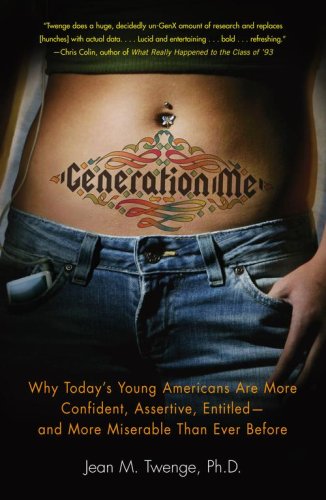All Nonfiction
- Bullying
- Books
- Academic
- Author Interviews
- Celebrity interviews
- College Articles
- College Essays
- Educator of the Year
- Heroes
- Interviews
- Memoir
- Personal Experience
- Sports
- Travel & Culture
All Opinions
- Bullying
- Current Events / Politics
- Discrimination
- Drugs / Alcohol / Smoking
- Entertainment / Celebrities
- Environment
- Love / Relationships
- Movies / Music / TV
- Pop Culture / Trends
- School / College
- Social Issues / Civics
- Spirituality / Religion
- Sports / Hobbies
All Hot Topics
- Bullying
- Community Service
- Environment
- Health
- Letters to the Editor
- Pride & Prejudice
- What Matters
- Back
Summer Guide
- Program Links
- Program Reviews
- Back
College Guide
- College Links
- College Reviews
- College Essays
- College Articles
- Back
Generation Me:
Jean Twenge, a current professor at San Diego State University, digs deep to uncover the mysteries about the current generation in her book, Generation Me: Why Today's Young Americans Are More Confident, Assertive, Entitled- and More Miserable Than Ever Before. As part of the generation Twenge describes in her book, I was quite interested to inquire what she had to say; it's quite a shocker to see how you fit into her descriptions.
Twenge researches a generation which she calls 'Generation Me', those born in the mid 1970's to the mid 1990's. The 'Generation Me-ers', as she calls them, are a generation that is 'highly optimistic', but are faced with 'crushing realities' (Twenge). Twenge then begins to elaborate on this notion; she believes that this generation has been taught to put self-esteem above all else, which has lead to self-importance and narcissism. Twenge notes that several schools even eliminate the honor-roll, because it makes the other children feel inferior; she believes that schools are focusing more on self-esteem based lessons rather than academic based lessons. Teachers are seen more as 'facilitators' rather than 'authority figures' (Twenge). Twenge believes that self-esteem leads to high expectations from the world, and with these high expectations we receive a bigger hit when we face reality. The depression and anxiety set in once we face reality. Therefore, expecting more leads to a greater downfall which then leads to depression. Twenge also goes on to reveal how our generation is more sexually active (even more than the free-love 60's and their 'Sexual Revolution'). Twenge notes that in the late 1990's the average age a young woman lost her virginity was age 15. Twenge notes that our generation is more open and free with their personal lives and even their bodies. The reasoning behind this finding is media. Twenge feels that the media delivers sexual innuendoes to all ages.
Twenge's book becomes increasingly repetitive towards the end, but her evidence is knowledgeable and clear. Twenge uses personal anecdotes, illustrative quotes, and solid data to prove her thesis. Twenge also uses examples from current movies, advertisements and T.V. shows to help paint a vivid picture of how the culture affects the 'Generation Me-ers'. These clear examples help the reader to connect with her arguments. Her book is more logical than emotional; she uses solid data to prove her point. Although she does provide ways in which to fix the generation, the book is often depressing to read. The book mainly points out the flaws and problems with the generation; there isn't much praise for the generation. The book is an interesting read if you are part of the generation she is describing. Personally I feel she was more biased on the issue, because she is in fact a 'Generation Me-er' herself. She could have been more brutal and bitter with her arguments, but because she is part of the generation she was more laid back and understanding. Her Greatest note is the ending sentence; 'Generation Me needs realistic expectations, careful career guidance, and assistance when we become parents. In return we will gladly lend our energy and ambition toward our work and toward helping others' (Twenge).
Similar Articles
JOIN THE DISCUSSION
This article has 0 comments.

